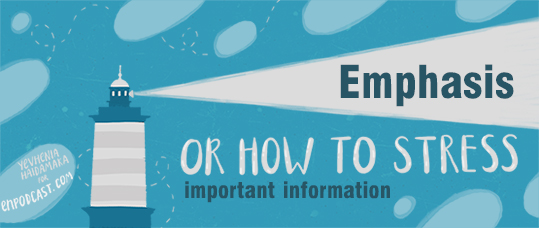Emphasis or How to Stress Important Information
Adam: Andrea! Hold on! Are you mad at me?
Andrea: No, why?
– You seem very mad.
– Well, maybe I am indeed. But what do you care at all?
– Come on, I thought we are friends.
– Oh, friends? Are we? Friends are not supposed to do that.
– What do you mean? I have no clue what you are talking about!
– I am mad because you didn't show up yesterday and didn't even call me. I was waiting for an hour and trying to get a hold of you and your phone was off. You actually stood me up!
– But I did call you yesterday!
– Ok, go ahead. Now you can make fun of my English!
– What? I wasn't making fun in the least bit.
– “I did call you!” Not making fun? Huh?
– Uhm, no! That's what's called grammar.
– Right!
– No, I'm serious. It's one of the ways to add emphasis. I'm trying to say that I actually called you last night. And I used emphasis so that you would believe me.
– Really? How do you do that?
– Well, this is actually possible only in Present Simple or Past Simple. The auxiliary verb (helping verb) “do”, “does” or “did” is used before the verb itself. And since we can use the identification of time only once in the sentence, the verb becomes a bare infinitive. For example: “I called you” becomes “I did call you!” The meaning is emphasized.
– I do want to believe that!
– Bravo! You're learning fast!
– Thank you. But that's not the point. How come I don't remember about it?
– I don't know what to say. It was you who answered the phone. The reason why I canceled the meeting was that my dog was hit by a car. I had to take him to the vet.
– Oh no! I hope he's ok!
– He is, thanks Andrea.
– Now, what was that thing that you used?
– What thing?
– The reason why... I didn't really catch it.
– Oh, it's another way to emphasize. You can split the sentence in two parts - basically use cleft sentences - for emphasis. Listen: My dog got hit by a car so I canceled the meeting. Sounds ok, but in order to add emphasis I'll say: The reason why I canceled the meeting is because my dog got hit by a car. Or “The vet said that he would be ok.” turns into “It was the vet who said that he would be ok”. And one more “I really hate when people smoke in the elevators.” becomes “The thing that I really hate is when people smoke in the elevators.”
– Seems easy. Let me try. I enjoy reading books in my free time. – The thing that I enjoy in my free time is reading books.
– Absolutely right. You can also use 'What clause' for that and say “What I enjoy in my free time is reading books.” And what I really need is you not being mad with me.
– Still, what I don't understand is why I don't remember the phone call. Is it right?
– It is indeed.
– Are you going to answer that?
– Oh come on! How am I supposed to know?
– Wait, what time did you call?
– Around three, why?
– Oh bummer! I had to leave for a half an hour and asked my colleague to answer the phone if it rang. So it was she who answered the phone.
– Aha! So it's your own fault! And you're mad with me. It is I who should be mad!
– Ok, forget it. Let's go have a beer or something.
So, here are some words, phrases and structures that are used to add emphasis:
Own – to intensify possessive adjective, as in 'It's your own fault'
Very – as in 'My dog got hit by car before my very eyes.'
Indeed – as in 'I'm very mad indeed'
In the least bit – to intensify a negative statement, as in ‘I wasn't making fun in the least bit.'
At all – as in 'what do you care at all'
Actually – as in 'You actually stood me up'
By no means – to intensify a negative statement, as in ‘I wouldn't say I was an expert, not by any means.'
Even – as in 'you didn't even call me.'
Present Simple and Past Simple in affirmative sentences
Subject + auxiliary verb + bare infinitive of the verb:
I did tell you the truth.
Cleft sentences:
The reason why we left is...
The thing that most annoys me is...
The person who I admire is...
It is my mother who said …
What Clauses:
What I want is … your help.
What we don't understand is...
What they are asking for is...
















